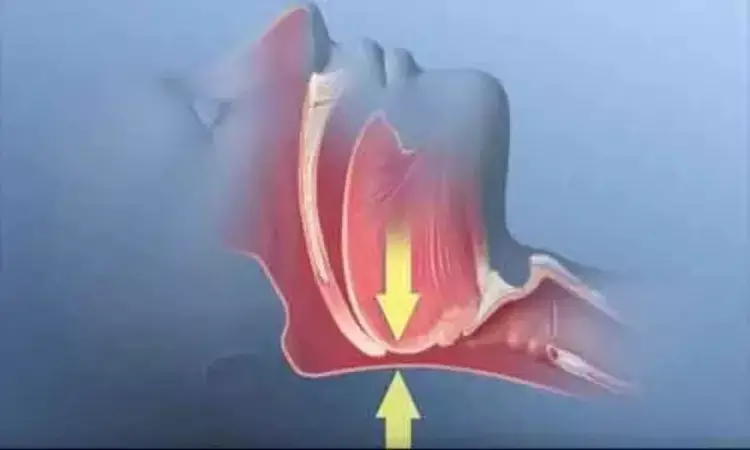- Home
- Medical news & Guidelines
- Anesthesiology
- Cardiology and CTVS
- Critical Care
- Dentistry
- Dermatology
- Diabetes and Endocrinology
- ENT
- Gastroenterology
- Medicine
- Nephrology
- Neurology
- Obstretics-Gynaecology
- Oncology
- Ophthalmology
- Orthopaedics
- Pediatrics-Neonatology
- Psychiatry
- Pulmonology
- Radiology
- Surgery
- Urology
- Laboratory Medicine
- Diet
- Nursing
- Paramedical
- Physiotherapy
- Health news
- Fact Check
- Bone Health Fact Check
- Brain Health Fact Check
- Cancer Related Fact Check
- Child Care Fact Check
- Dental and oral health fact check
- Diabetes and metabolic health fact check
- Diet and Nutrition Fact Check
- Eye and ENT Care Fact Check
- Fitness fact check
- Gut health fact check
- Heart health fact check
- Kidney health fact check
- Medical education fact check
- Men's health fact check
- Respiratory fact check
- Skin and hair care fact check
- Vaccine and Immunization fact check
- Women's health fact check
- AYUSH
- State News
- Andaman and Nicobar Islands
- Andhra Pradesh
- Arunachal Pradesh
- Assam
- Bihar
- Chandigarh
- Chattisgarh
- Dadra and Nagar Haveli
- Daman and Diu
- Delhi
- Goa
- Gujarat
- Haryana
- Himachal Pradesh
- Jammu & Kashmir
- Jharkhand
- Karnataka
- Kerala
- Ladakh
- Lakshadweep
- Madhya Pradesh
- Maharashtra
- Manipur
- Meghalaya
- Mizoram
- Nagaland
- Odisha
- Puducherry
- Punjab
- Rajasthan
- Sikkim
- Tamil Nadu
- Telangana
- Tripura
- Uttar Pradesh
- Uttrakhand
- West Bengal
- Medical Education
- Industry
Respiratory muscle training promising for managing symptoms of obstructive sleep apnea

Brazil: A recent review published in the Journal Of Sleep Research has highlighted the potential benefits of respiratory muscle training (RMT) in managing certain symptoms of Obstructive sleep apnea (OSA).
The results revealed that inspiratory muscle training positively affected factors such as systolic blood pressure and sleepiness in OSA patients compared to control groups. However, it did not significantly impact the apnea-hypopnea index, forced vital capacity, sleep quality, or overall quality of life. On the other hand, expiratory muscle training demonstrated improvements in muscle strength and sleep quality compared to control groups, but it did not show notable effects on sleepiness. It is important to note that the evidence regarding the effects of expiratory muscle training on the apnea-hypopnea index remains uncertain.
Obstructive sleep apnea is a prevalent sleep disorder significantly affecting individuals' well-being and quality of life. Recent research published in the Journal Of Sleep Research by Andre Silva De Sousa and the team has explored the potential of respiratory muscle training as a safe and effective approach to alleviate symptoms in OSA patients. A comprehensive review of randomized-controlled trials aimed to assess the effectiveness and safety of RMT in managing OSA symptoms. The findings shed light on the promising potential of RMT while emphasizing the need for additional research in this field.
The study, registered in the Prospero Platform and conducted in accordance with PRISMA guidelines, included a meticulous search of various databases, resulting in the inclusion of 13 randomized-controlled trials involving 432 participants. These trials investigated the impact of RMT as a treatment for OSA patients aged 18 years and above, excluding those with unstable disorders, spinal cord injuries, or neuromuscular diseases. The certainty of evidence was evaluated using the Grading of Recommendations Assessment, Development and Evaluation (GRADE) system, ensuring a rigorous assessment of the data. The primary focus was on the effect of RMT on various OSA symptoms.
While the review highlights the potential benefits of RMT in managing certain symptoms of OSA, it is essential to acknowledge the limitations of the included studies. The small sample sizes and short intervention periods may have influenced the results, underscoring the need for further research with larger and more diverse populations to obtain more conclusive findings.
Patients diagnosed with OSA should consult with healthcare professionals to determine the most suitable treatment options tailored to their specific needs. As research in this field continues to progress, respiratory muscle training may emerge as a valuable adjunct therapy for managing OSA symptoms.
It is important to note that respiratory muscle training should only be undertaken under the guidance of qualified healthcare professionals. Further research will provide a deeper understanding of the optimal protocols and long-term effects of RMT in improving the lives of individuals with OSA.
Reference:
Silva de Sousa, A., Pereira da Rocha, A., Brandão Tavares, D. R., Frazão Okazaki, J. É., de Andrade Santana, M. VFernandes Moça Trevisani, V., Pereira Nunes Pinto, A. C. (2023). Respiratory muscle training for obstructive sleep apnea: Systematic review and meta-analysis. Journal of Sleep Research, e13941. https://doi.org/10.1111/jsr.13941.
Dr Kamal Kant Kohli-MBBS, DTCD- a chest specialist with more than 30 years of practice and a flair for writing clinical articles, Dr Kamal Kant Kohli joined Medical Dialogues as a Chief Editor of Medical News. Besides writing articles, as an editor, he proofreads and verifies all the medical content published on Medical Dialogues including those coming from journals, studies,medical conferences,guidelines etc. Email: drkohli@medicaldialogues.in. Contact no. 011-43720751


